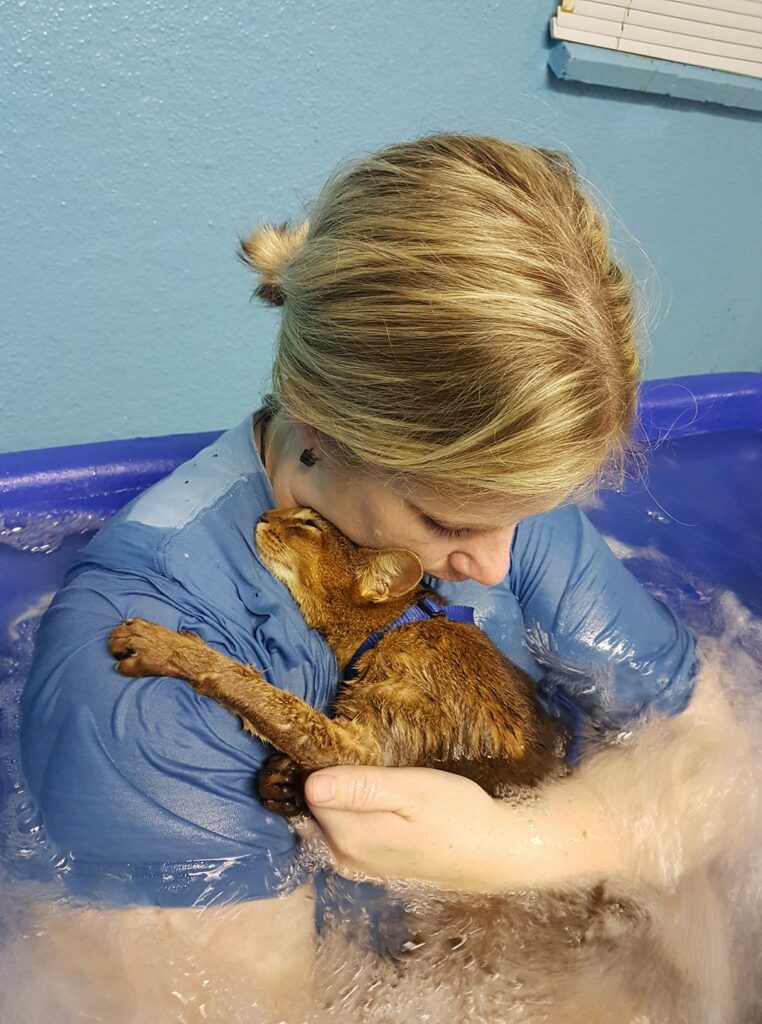Animal Fitness Centre
Sr Mandy McCue
I talk to an inspiring human who started her own physiotherapy business just a year after qualifying as a veterinary nurse. Twenty years ago few thought it would be viable but today, going strong is an understatement.
DID (Dissociative Identity Disorder, previously known as multiple personality disorder) and FOMO (fear of missing out) may be what’s wrong with Danny. He’s the poster boy on the VetNurseView home page; blonde ‘Wella’ hair and the sassy genetic mishmash of Labrador, Golden Retriever and Collie. Despite his afflictions, you would think he’s a different dog when he visits Mandy, his physiotherapy nurse.
Make an appointment already!
It’s taken an age to get an interview with Sr Mandy McCue. I thought she was downright ignoring me!
I thought it rude when my initial request for an interview received all of zero responses. I later discovered that Mandy couldn’t be a nicer, more down-to-earth human being; not rude at all. She opened up shop in 2001, just a year after she graduated from Onderstepoort and she has been overwhelmingly busy ever since.
Someone cancelled their appointment with Mandy and I have exactly 45 minutes to sit down with her and glean as much information about the Animal Fitness Centre as I can. She takes me on a whirlwind tour through her house where, over the years, she and her family have converted rooms and built pools. We sit down for a rapid-fire Q and A—my shorthand skills working double time.
After qualifying as a vet nurse from Onderstepoort in 2000, Mandy worked at a busy emergency veterinary hospital in the Western Cape. “Cases were either euthenased or they got better; there was no in-between. I felt like there had to be another way and I decided to do something about it.”
Known as physical rehabilitation back in the day, starting a physiotherapy referral centre for animals fell on uncharted ground and few believed that it would catch on.
The Early Days
She recalls a patient at Onderstepoort during her studies. The University had a small physiotherapy unit in those days and the students were rehabilitating a dog with acute idiopathic polyradiculoneuritis or Coonhound paralysis (more common in the USA, it is caused by infection from a raccoon bite). The disease (which is rare in South Africa and not caused by raccoon bites because we don’t have them) causes inflammation of nerve roots and peripheral nerves that can slowly result in paralysis. Good nursing care and physiotherapy can lead to successful recovery. After witnessing the gradual but positive effects of water therapy each day, Mandy was sold on the true value of the modality.
At the turn of this century, animal physiotherapists were scarce in South Africa. Mandy devoured as much information as she could find from international animal physiotherapists; taking courses on various modalities including transcutaneous electrical nerve stimulation (TENS), neuromuscular electrical stimulation (NMES), massage and laser therapy. She also completed the CCRP (Certified Canine Rehabilitation Practitioner) course through the University of Tennessee in 2018.
Despite a sluggish start—one or two cases a week—vets were struggling to find competent practitioners who could rehabilitate their surgical patients. But gradually as her efforts bore fruit, more and more vets started referring cases to her. She also had a gig as the guest host of an animal health programme for Radio 702 and Cape Talk.
As she rattles off all the facts, I can’t help but think how youthful her skin looks! She laughs, “All day spent in warm, steamy water will do that!” And she loves the fact that her uniform is a ‘short-pant’, a T-shirt and no shoes.
Today, Mandy runs her centre with her mom, dad and assistant, Patricia. Whilst she provides all the physical therapy, her family takes care of bookings, administration, finances, cleaning, heavy lifting, filtering the water meticulously (a very important and time-consuming aspect) and whatever else is needed to run this fantastic service. She is fully booked a month in advance and is in no way interested in promotional puff!
The Animal Fitness Centre caters to many different types of health issues including rehabilitation from surgery like cruciate ligament repair, femur head resections, elbow dysplasia operations, hip replacements as well as for pets recovering from broken bones, arthritis and obesity.
Soft tissue challenges like skin wounds or muscle damage can also be treated at her centre.
The most popular therapy happens in the water. There is the Jacuzzi-type hydro spa for massage (a balmy 32℃) and the swimming pool (28 ℃). The temperature in the hydro spa is warm enough to ease muscles and tendons for more effective results from the massage. Exercise in the pool is low-impact and allows for a greater range of motion without putting strain on joints.
A unique approach
Mandy is one of the few in her field who uses water therapy with cats. I ask her whether dipping cats in water poses a serious risk to her as I envision a terrified cat stuck to her face. She explains that her feline patients tend to respond positively to confident handling.
“If you handle the cats with purpose and intention, it seems to make them trust you”. But, if they are completely overwhelmed, Mandy will opt for a different modality. Each patient is unique; no treatment regimen is alike and Mandy tailors a therapeutic routine that suits individuals rather than forcing them to comply with pre-set procedures. She neither forces her patients nor bombards them with stimuli, saying that they respond better to therapy when they are happy. They first have to give her permission to treat them before she begins.

An initial consultation involves understanding the pet’s baseline requirements. Mandy first obtains their full history from the vet, which includes current medication and pre-existing conditions (like allergies or heart problems) and discusses her client’s expectations. For example, an athletic dog may need extensive treatment to be able to move without pain whereas an elderly dog with arthritis may need to be treated conservatively just to keep pain to a minimum. For overweight dogs, Mandy also provides weight counselling because carrying extra kilos usually causes painful joints.
The other ‘toys’ in the treatment room are exercise balls, balance boards and cavalettis. If a patient will not tolerate water, there are several ways to encourage joints and muscles on dry ground.
Mandy tells me about a few of her operational rules.
First, she wants every patient to absolutely love their time with her.
Second, she doesn’t ‘do’ nails; cutting a pet’s nails can sometimes be extremely traumatic and she’s not a groomer. She needs the patient to be at ease and confronting them with nail clippers doesn’t leave anyone happy.
No cages; only one patient is seen at a time. Caged and barking dogs mess with her Zen. The point of therapy is compliance and peacefulness, and as she has told us, therapy is more successful when patients are calm and happy.
To further reduce stress, there are no tables and the chairs are baby-sized.
Anxious owners are often better off waiting outside as they transfer their anxiety onto their pets. Pets can’t concentrate on the treatment when they feel obliged to protect anxious owners.
I ask Mandy about aggressive pets. She explains that she rarely requires a muzzle. In the case of a vicious dog, she will sit quietly in the same room as the dog and wait for permission to proceed. Mandy finds that, after being ignored for some time, a dog’s curiosity will usually lead to approach and submission. This, Mandy says, is the sign that the dog has given permission and she rarely has an issue with aggression after that.
“Are owners allowed to watch?” I ask. As long as they do not change the pet’s behaviour by their presence, Mandy encourages them to witness the treatment and take as many pictures as they want.
Often, vets do not have the time to explain the rehabilitation process, so Mandy spends much of her client interaction on education. She also teaches her clients how to do certain therapies at home and is very strict about it. Mandy can tell if homework has not been completed and gets rather impatient when clients are not pulling their weight!
Many of Mandy’s new patients arrive with poor prognoses but she says that her rate of success is high. With over 20 years of experience and a calendar that is fully booked each month, I am not surprised. If she had been disheartened by the nay-sayers twenty years ago, she would not have been the in-between for countless grateful clients and pets.
All too quickly, the next client has arrived and I have to move on. As I leave, Mandy shows me the bottom of the door between the waiting room and the hydro spa. It has been freshly painted, but I can still make out the deep scratch marks from impatient dogs. I smile at the vision of our Danny, concentric circles in his Mr Hyde-like eyes and his frazzled blonde hair just itching to cross over to that watery heaven and Mandy’s expert touch. I have to cut the dream short as I am ushered out to make way for the next lucky pet.
It’s due to Mandy’s vision and tenacity that pets don’t have to settle for euthenasia or just getting better; there’s something in-between that makes a little more sense.
Copyright Liz Roodt 2023

